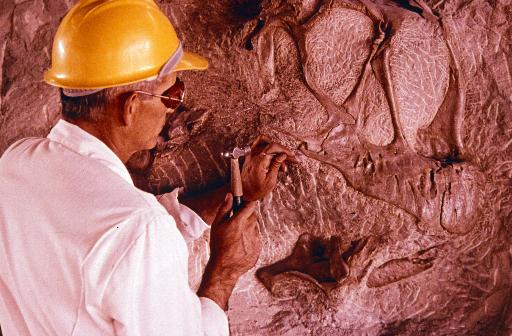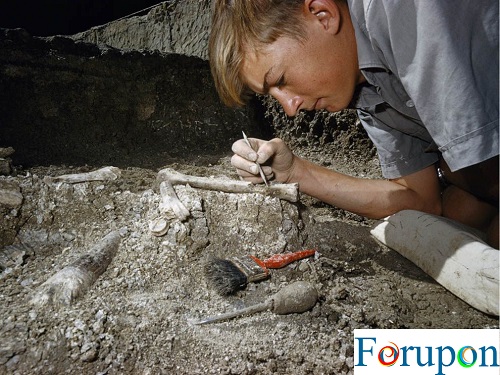What is a paleontologist?

A paleontologist is a scientist who studies the history of life on Earth through the fossil record. Fossils are evidence of past life on the planet and can include those formed from animal bodies or their imprints (body fossils). Trace fossils are another kind of fossil. A trace fossil is any evidence of the life activity of an animal that lived in the past. Burrows, tracks, trails, feeding marks, and resting marks are all examples of trace fossils.
If I want to study or have a career in paleontology, what classes should I take in middle or high school?
For upon |Take as many Earth science, biology, chemistry, physics, mathematics, and computer science courses as you can. English is also important since scientists need to write clearly and communicate their findings to others on a regular basis. You might also find it helpful to take a course in public speaking and a foreign language. Find out what after-school organizations your school has that can help you with a career as a paleontologist, such as Science Clubs and Fossil Clubs. Also, consider doing a paleontology-focused project for your local science fair and look for summer experiences in paleontology at nearby colleges and universities.
At the university level, what courses should I take?
To become a paleontologist, college students need to first follow the undergraduate course of study recommended by the geology departments in their colleges and universities. In their undergraduate program, they will need to have a concentration in life sciences, as well as geology. Frequently offered courses can include those in paleobotany, invertebrate paleontology, vertebrate paleontology, and evolution. Students will be able to focus more on paleontology-related courses in their advanced degree programs.
What are the educational requirements for becoming a professional paleontologist?
To be a paleontologist requires an advanced degree (Master’s or Doctorate). A common trick is to take a bachelor’s degree in geology before going on to an advanced degree in paleontology.
Where do paleontologists work?
Jobs in paleontology are found in universities, museums, oil companies, and state and federal government agencies. University paleontologists generally work as instructors and/or researchers. Museum paleontologists prepare and care for fossil collections. Paleontologists who work for state or federal agencies or oil companies generally work with fossil identification, regional mapping projects, and a variety of other projects.
Where can I find more information on paleontology?
- Geoscience Careers: www.earthscienceworld.org/careers/index.html
- Paleontological Research Institution: www.priweb.org/ed/lol/careers.html
- University of California Museum of Paleontology: www.ucmp.berkeley.edu/
- Paleontology for Kids: www.collegecrunch.org/school-research-library-paleontology-for-kids/
- Geoscience Salary Information (AGI): www.americangeosciences.org/workforce/currents
The article was originally published here.


Comments are closed.